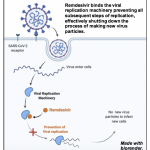By: Rachel Levene, PhD Candidate in Molecular Microbiology at Tufts University School of Medicine and daughter of Dr. Eric Levene, Chester Pediatrics.
With all this good news on the COVID19 treatment front, I’m back again to share some information about how Remdesivir works to treat COVID19. COVID19 is the disease caused by a virus called SARS-CoV-2. Before we can learn how Remdesivir works, we need to understand how viruses work.
Viruses can cause illness by making more of themselves. Viruses have one goal. It is to make more of themselves so that they can find a new person to infect. When they enter our cells, they hijack our cells turning them into little virus factories. This process is called viral replication. Our immune system responds by making antibodies and chemicals that stop viral replication, helping us recover. If we haven’t had this particular virus before or have not been vaccinated against it, we have no antibodies to help stop replication, and the virus 
giving our immune system some extra help in shutting down the virus. So how does the novel coronavirus replicate and how does Remdesivir stop replication?
Viruses need to copy their genes, just like us. Viruses enter our cells by binding a specific receptor, like a key into a lock (see figure). In order to make more of themselves, they need to copy their genes so that they can be passed onto the new virus particle. This is just like when we make new cells all of our genes need to be copied so they can be passed on to the new cell. Viruses often cannot use the same replication machinery as our cells, so they bring their machinery to do so. This is called the viral replication machinery (see figure). One good thing about this is that their machinery is different from ours. This allows us to design drugs that only interfere with the viral replication machinery and not our cellular replication machinery. If we can prevent the virus from replicating its genes, we can prevent the production of new virus particles. That prevents new cells from becoming infected, shutting down viral replication (see figure). One of these drugs that block the virus from copying its genes s Remdesivir.
Remdesivir blocks viral replication. Remdesivir inhibits the viral replication machinery, preventing it from copying the virus’s genes. This prevents the production of new virus particles and in turn new cells from being infected (see figure). However, just because it can bind the viral replication does not mean it will always be effective in treating the viral infection. This is where the story of Remdesivir’s production comes into play. Remdesivir was originally developed to treat hepatitis C and was then “repurposed” to treat the Ebola virus disease. Although it had some success in treating Ebola, another drug ended up proving more effective. Because the machinery that the Ebola virus and hepatitis C virus use to replicate their genes is similar to that of SARS-CoV-2, it was though that Remdesivir could potentially work to treat COVID19. It was first tested in the lab, where it showed success in blocking SARS-CoV-2 and other related coronaviruses from replicating. It was given by ‘compassionate use’ to patients with COVID19. Doctors can request approval to use an unapproved drug when there are no other options for treatment and the company that makes the drug agrees to it. In these compassionate use cases, there were reports that patients recovered. Thus, the seeds for starting a broader clinical trial were born.
Remdesivir shortens the length of illness. Many clinical trials are in progress but recently we learned about results from one sponsored by the National Institute for Allergy and Infectious Disease. In this trial, COVID19 patients were enrolled providing they met strict criteria – meaning that they had laboratory-confirmed COVID19 and had moderate to severe illness. After patients gave informed consent to participate in the trial, they were randomly selected to receive Remdesivir or a placebo. Neither the patient nor the doctor knew which group the patient was assigned to. This is called a randomized, double-blind clinical trial and is thought to be the gold standard to evaluate the efficacy of a drug. This study enrolled ~1,000 patients and they found that Remdesivir reduced the length of illness by 1/3. It has been reported that these promising results will likely lead the FDA to give Remdesivir emergency use authorization. This does not mean it will have full FDA approval, but that given the current situation the FDA thinks the benefits outweigh the risks. Remdesivir is given by IV and is not currently available as a pill, chewable or liquid suspension. This makes it difficult to provide to people who are just mildly ill and do not need hospital care. Nonetheless this a promising step in our fight to develop drugs against COVID19.
Allied Physicians Group is a partnership of more than 150 dedicated, caring physicians and 350 highly trained support staff. Allied serves over 180,000 patients with offices throughout Greater New York City, Long Island, the Hudson Valley, and beyond. Founded in 2006, Allied Physicians Group is a recognized leader in increasing healthcare efficiencies and patient satisfaction, emphasizing support, innovation, and collaboration. If you are looking for a Pediatrician near you click here or for more information please visit https://alliedphysiciansgroup.com/.
